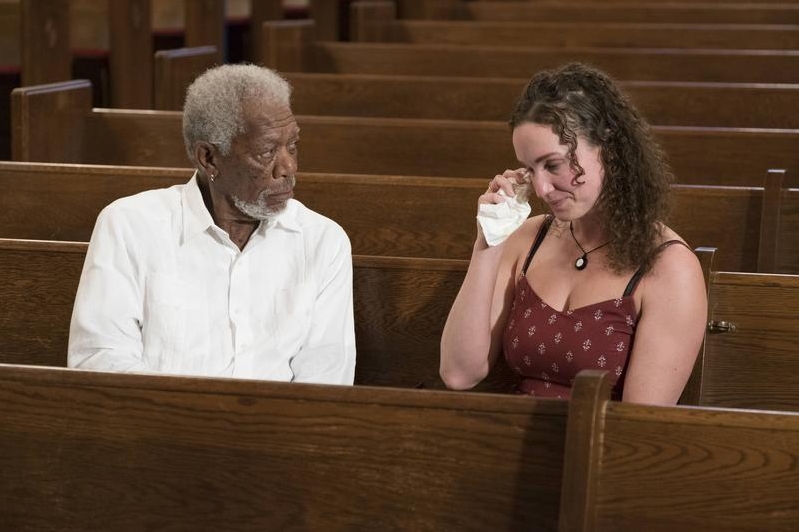
Megan Phelps-Roper grew up in the Westboro Baptist Church, a congregation known for preaching a message of hate, judgement, and fear. Since leaving the church in 2012, Phelps-Roper uses her platform to both advocate for those she was taught to despite and encourage others to reach out across seemingly unbridgeable divides.
"We need to talk about the things that we have in common and the things that unite us," Phelps-Roper told The Gospel Herald in an exclusive interview. "It can be so easy in this political climate to see only the things that make us different and jump on those things, and that's an incredibly destructive way of seeing the world."
The granddaughter of Westboro Baptist Church founder, the late Fred Phelps, and the daughter of the church's de-facto spokesperson, Phelps-Roper grew up immersed in hateful theology. She, along with about 80 other church members, would picket soldiers' funerals, synagogues, schools, and other events, holding signs bearing phrases like "God hates fags" and "America is doomed."
"I grew up on the picket line, picketing every single day in Topeka, Kansas and all across the country," she shared. "Seeing a woman who was wearing makeup and having her hair trimmed -- those were marks of an outsider to me, and I would not be close to those people. I had no interest in getting to know them, I wanted nothing to do with them."
Surprisingly, Phelps-Roper pointed out that she and her siblings weren't isolated from the world -- in fact, they were very much a part of it. They went to public school, read Stephen King books, and even listened to pop music. However, it was always from a "perspective of judgement," she explained.
"We were aware of all of those things, and it was part of our lives," she said. "But, because we were also so immersed in Westboro's' culture and understanding of the Bible and the way that they judge everyone and everything outside of the church, it was like being inoculated against those ideas, so they couldn't have power over us."
In 2009, Phelps-Roper decided to use Twitter as a way to further the church's message. However, dialoguing with perceived "enemies" online was key in her decision to leave the church and its way of life just three years later.
"Twitter is where my first doubts came from," she said. "I immediately started attacking a Jewish man named David Abitbol, and when he first responded, it was exactly the sort of response I'd expected, which was incredibly negative and hostile. But soon, he started changing the way that he spoke to me; instead of digitally yelling at me, he started asking questions. He was the first person to articulate a contradiction in Westboro's doctrine I had missed my entire life."
Arbitol, along with others, took the time to engage with Phelps-Roper and understand where she was coming from. That way, they were able to effectively challenge the views she grew up believing.
"It was definitely a process, it took over year of ongoing conversation, but I began to understand that we were just human beings who did not have a monopoly on truth," she said. "Our ideas weren't necessarily divinely inspired, we were just humans trying to understand the Word of God."
She added, "That was really important, because it gave me the confidence to question other things that didn't make sense as they came up."
Her decision to leave the Westboro Baptist Church came at a devastating cost.
"I lost my family, and I felt like I had betrayed them and everyone and everything that I ever believed in," she said. "They were the only people we were allowed to have close relationships with. Losing them forever was definitely the the hardest part about leaving, and it still is."
Five years later, Phelps-Roper contends that much of her determination to "do good and be good to people" stems from what she was taught at Westboro Baptist.
"I know it sounds counterintuitive," she said, "but I see it as, these are people who have simply been persuaded by bad ideas. I don't assign blame to the person, because for whatever reason, they are this way and have these beliefs. The answer isn't trying to isolate them, but really engage with these ideas and find ways of countering them with better ones. I don't think that happens without good, continued engagement and time."
On November 8, Phelps-Roper shares her story on an episode of The Story of Us with Morgan Freeman titled "Us and Them." In it, she reinforces the idea that it's possible to bridge the divide with those who hold differing convictions.
"First, don't assume bad intent," she told GH. "Understand that they have these beliefs for a reason, they have experiences that motivate these beliefs. This is not an inherently hateful person, and hopefully, they can be reasoned with."
Second, ask questions: "It's important to get to the heart of what they believe and why so we can effectively construct arguments against those ideas," she said.
Third, stay calm, Phelps-Roper advised.
"It is very difficult when you're dealing with someone who's saying things that you feel are incredibly destructive and hurtful," she said. "But, if you really want to get through and have an impact on somebody and get them to question their beliefs, it's one of the most effective ways I can think of doing it."
Fourth, making compelling arguments: "When we are talking to people deep in these beliefs, we have to articulate why our way is a better way, why is compassion and empathy and kindness better," she explained. "We have to be able to articulate those things in a way that they can hear if we really want people to change."
Finally, be patient: "People don't change in an instant," she said. "It's a process, and we can see every interaction that we have with these people as an opportunity to encourage them in a better direction."
Based on her experience, Phelps-Roper also encourages others to harness the power of social media for good.
"Twitter changed the way that I communicate with people, partly because of the way people engaged with me, but also because we control the quality of our conversation," she said. "You don't have to respond with the same level of hostility of that people come at you with. It can be hard to do that, but I absolutely believe it's a skill that we can learn. The fact that social media is still so new gives us a huge opportunity for us to learn better ways to engage with others."







